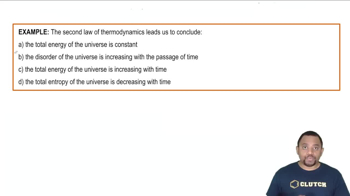Here are the essential concepts you must grasp in order to answer the question correctly.
Ideal Gas Law
The Ideal Gas Law describes the relationship between pressure, volume, temperature, and the number of moles of an ideal gas, expressed as PV = nRT. This law is fundamental in understanding gas behavior under various conditions, particularly in thermodynamic processes. In the context of the question, it helps analyze how the gas expands and the changes in its state variables.
Recommended video:
Second Law of Thermodynamics
The Second Law of Thermodynamics states that the total entropy of an isolated system can never decrease over time. It implies that natural processes tend to move towards a state of maximum disorder or randomness. In the case of the gas expansion, the increase in volume leads to an increase in entropy, illustrating this principle as the system evolves towards a more disordered state.
Recommended video:
Second Law of Thermodynamics Example
Isolated System
An isolated system is one that does not exchange matter or energy with its surroundings. In thermodynamics, this concept is crucial for analyzing processes without external influences. The gas expansion in an isolated system allows for the examination of internal changes, such as energy distribution and entropy, without the complications of heat or work interactions with the environment.
Recommended video:
 McMurry 8th Edition
McMurry 8th Edition Ch.18 - Thermodynamics: Entropy, Free Energy & Equilibrium
Ch.18 - Thermodynamics: Entropy, Free Energy & Equilibrium Problem 85b
Problem 85b


